The Name of God: A Vaishnava-Christian Dialogue
By Krishna Lila dasi | May 25, 2013

(Photos by Jerry Carney.)
Potomac, Maryland—It’s a topic that one might have expected was studied by this group years ago. But that fact is, only after a decade and a half of Vaishnava-Christian dialogues did this noteworthy group of scholars and practitioners which meets every spring choose, as its 2013 topic, “The Name of God.”
The Vaishnava-Christian Dialogue, an annual interfaith event held in the suburbs of Washington, D.C. every March or April, draws twenty participants, ten each from the Vaishnava and Christian traditions, for two days of discussion, shared vegetarian meals, and an experience of each other’s worship and prayer.
“Many of the members that join this dialogue have been coming for years,” said Rukmini dasi. “We have become fast friends, and enjoy not only the insights gained from the meeting, but also the depth of each other’s spirituality.”

Members of the 2013 Vaishnava-Christian Dialogue held in the suburbs of Washington, D.C.
Former topics at the Dialogue have included “Spirit in the World: Affirmation/Renunciation,” “Theodicy,” “Incarnation,” “Why We Dialogue,” “Spiritual Discipline,” and “The Soul and Its Destiny.”
This year’s meeting on April 26-27 was the first since the group cooperated in publishing a special volume of the Journal of Vaishnava Studies (JVS) in spring 2012. That edition of the 250-page JVS exclusively featured articles regarding the group’s fifteen years of dialogue. It contained papers presented at past meetings, plus articles discussing the importance of this Dialogue and the broader history of Christian-Hindu encounters.

Father James Reddington, Ravindra Svarupa das and Dvija Mani das share readings during the the Christian prayer service
For 2013, two papers were presented on “The Name of God.” Professor Gerald Carney, a scholar of South Asian Religions at Hampden-Sydney College in Virginia and a practicing Roman Catholic, opened the session with his analysis of the importance of God’s name the Hebrew and Christian Bibles (or the Old and New Testaments).
Readings sent to the group by Professor Carney to be studied prior to the Dialogue included Biblical excerpts such as the following prayer from the Psalms.
I will praise you, LORD, with all my heart; I will declare all your wondrous deeds.
I will delight and rejoice in you; I will sing hymns to your name, Most High. (Psalm 9)

Dialogue participants stand during the aroti ceremony and Vaishnava service on Saturday morning
Readings also included sections of the medieval Orthodox text, “Way of a Pilgrim,” as well as contemporary writings.
“Some of my colleagues wondered if there was enough content from the Christian side to sustain a two day dialogue,” said Professor Carney. “In my research I found there was much to study throughout Christian history about God’s name.”
Several Vaishnavas revealed their own affinity to the Way of a Pilgrim.

Sraddha dasi explains the importance of meditation of the names of God in the Vaishnava tradition of worship
“I read that book as an undergraduate student in college,” said Anuttama Dasa, coordinator of the Dialogue. “I was pleased to reread sections of it, and now view it through the eyes of the Vaishnava tradition. It chronicles the spiritual experience of a Christian pilgrim who takes up the constant chanting of the Jesus prayer, ‘Lord Jesus Christ, have mercy upon me.’ It has much in common with the meditation on the Holy Names: Hare Krishna Hare Krishna/Krishna Krishna Hare Hare/ Hare Rama Hare Rama/Rama Rama Hare Hare as taught by Gaudiya Vaishnavas,” Anuttama said.
Dvija mani Dasa, Vaishnava practitioner and Sanskrit scholar, followed Professor Carney with an overview of the theology of God’s name and its historic place in worship and prayer, in the Vaishnava traditions.

Elaine Watt led the Christian prayer service with the help of a small altar displaying symbols of Christian devotion
The advance readings Dvija mani had provided included excerpts from the Sisastaka of Sri Krishna Caitanya, and Stavamala of Rupa Goswami.
The first day of dialogue was spent in discussion on the papers from the two scholars and ended with dinner. The second day, Saturday, began as it has every year in sharing a traditional mixed-culture breakfast of upma, chutney, home made blueberry muffins, and scrambled curd, catered by the local ISKCON Temple.

Pictures of Radha-Krishna and Sri Caitanya Mahaprabhu grace a humble altar created to share the experience of a Vaishnava aroti ceremony
After breakfast, the assembled group observed—or participated, according to their taste—in two separate worship or prayer services, led respectively by a Christian and a Vaishnava. Both half hour services focused their readings, songs and comments on the Holy Name theme.
The balance of the second day was spent in continued conversation about the worship experience, the Holy Name topic, and planning for the 2014 meeting.
Next year’s topic was decided to be “Mother of God.” Both Vaishnava and Christian traditions have a rich theology and long standing artistic expressions of this devotional concept to draw from. With sixteen years of conversations behind them, this interfaith group still believes it has much left to explore, share and learn.















